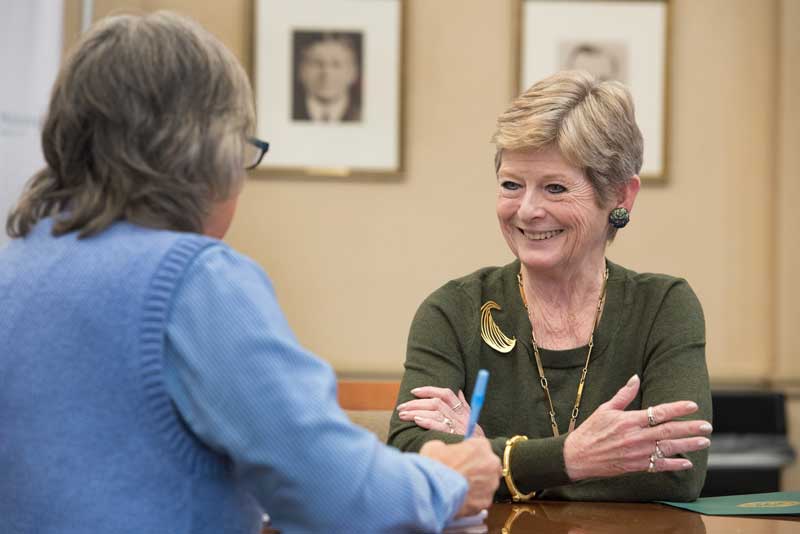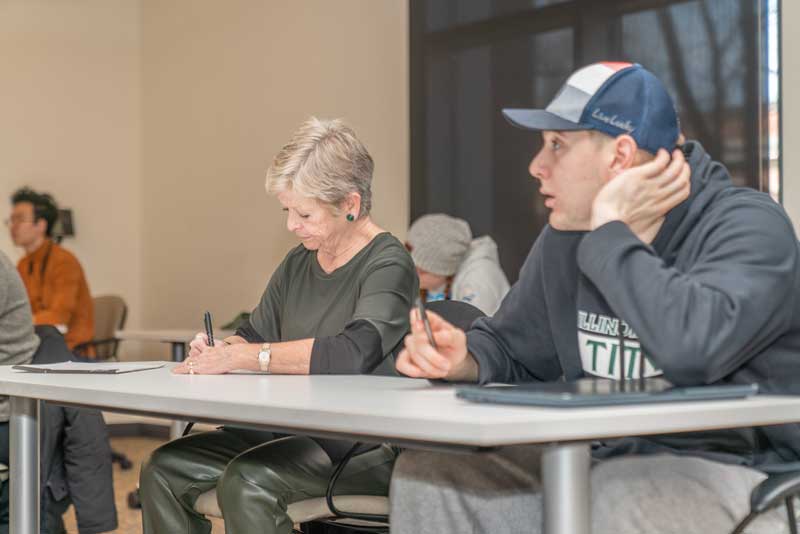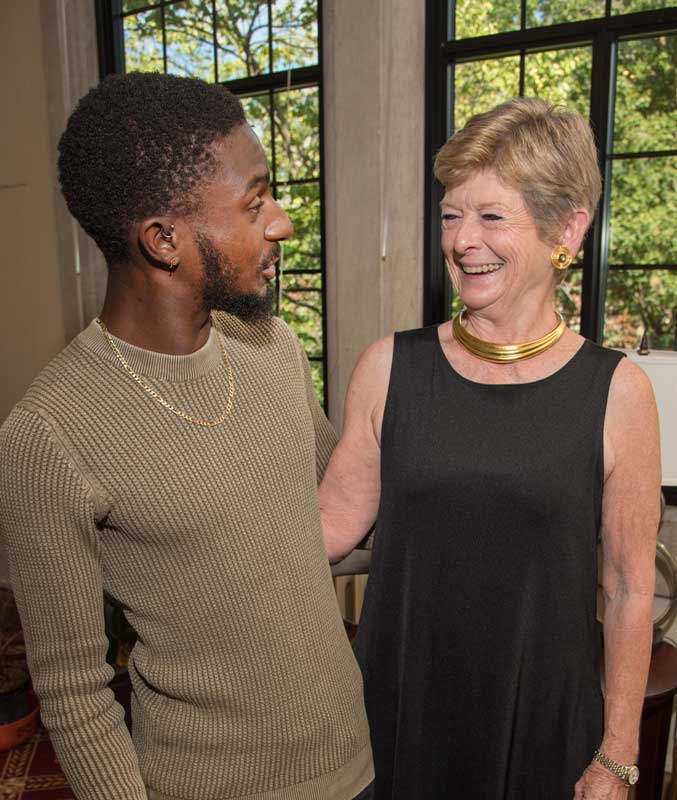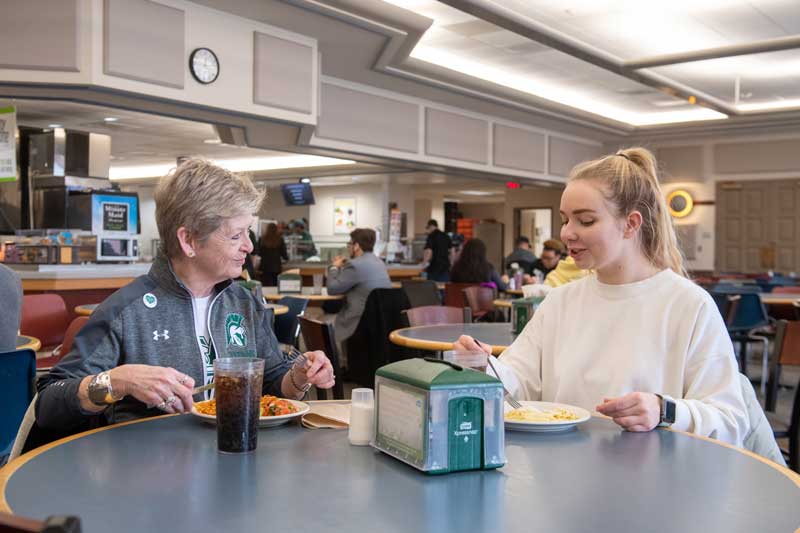A Life of Change
In 2019, Georgia Nugent came to Illinois Wesleyan as an interim president, and by the end of the year, the Trustees had made it her permanent post. Normally, this would call for more ceremonial fanfare, including a full biographical feature telling our president’s life story, but COVID-19 was not interested in having a normal year in 2020.

But now the pandemic is drawing to an end, and Georgia is hitting the road. She has and will be visiting alumni in nine states and the District of Columbia for her Presidential Tour between 2022 and 2023, making it the perfect time to meet our “new” president to find out where she came from and what made her who she is today.
Georgia was born in the American South. Her life began in New Orleans before her family set up a home base, of sorts, in Miami, but she is truly from just about everywhere in the country.
Previous generations of the Nugent family had been horse trainers raising mares and stallions to pull carriages. But when carriages began to be driven by internal combustion engines rather than beasts of burden, Georgia’s grandfather needed to find a new way to make use of his generational skills. And, even if horses were out of a job on the roads, they still had a place on the race track.
Georgia, the only child of only children born well into her parents’ 30s, was not destined to take on the family business. Her biological dice roll had a streak of irony as she ended up with a childhood allergy to horses. She could never work with the animals that her father moved around the country to train, bringing his family with him. Her parents weren’t concerned, though. They had other plans for her, as far as she understood.
Even though neither of her parents had gone to college, “it was always assumed that I would,” Georgia said, though it was never said at the time. “It was a kind of tacit understanding.”
The expectations perhaps came more from her mother.
“She cared that I did well in school,” Georgia said. “She was of that generation where women didn’t have a lot of opportunities, and I think that was hard for her. She experienced what I think a lot of women did as a kind of latent bitterness that they couldn’t do something on their own.” But Georgia’s childhood was filled with the interesting opportunities of a life on the road.

“You follow a circuit” in the horse racing world, as Georgia explained. “You’re in Miami for the winter, then, as spring comes, there’s the short season at Churchill Downs in Louisville. Then you go up to Chicago and Detroit and back to Churchill Downs in the fall and come back to Miami.”
These circuits, both annual and daily, introduced Georgia to every strata of society. She attended both well-funded and neglected schools, and her family befriended both stable cleaners and millionaires. In every situation, Georgia learned to adapt.
“You constantly have to encounter new people, make new friends, leave some friends behind. I think it led to a lot of comfort with change,” she said.
Her comfort is perhaps what drove her toward and prepared her for a life of dramatic change, both for herself and the world around her.
· · ·
The most drastic change she found herself part of was at Princeton, Georgia’s alma mater, where she was a member of the class of 1973 — the first to admit women to Princeton.
“There were about 150 of us women who were admitted to a school with about 4,000 male students, and I loved it,” Georgia said. “It was a kind of community I didn’t have as we were moving around, but it was essentially an all-male environment after I had already grown up in one.”
Not that Princeton had such an easy time adjusting. Impelled by its sense of mid-century propriety, the school installed curtains on the women’s dorm windows and locks on their doors where they had never existed in student housing before.
“We broke the locks,” Georgia said. “We didn’t want to be different, you know? We didn’t want to be protected.” The dorm floors became coed by her second year.
Georgia’s inconsistent schooling left her with conspicuous holes in the Western canon, but, even though she had never heard of Homer, Plato or Aristotle, she fell in love with them. She declared classics as her major, even as her major was still getting used to her.

“I was in a class with five students — two of us were women — and an older professor, and he would always start by saying ‘Gentlemen, we will begin at page so-and-so,’” Georgia said, though he seemed to be aware of the women present when the fact made him uncomfortable.
“We were studying Lucretius in that class, and there’s a part of one of his major poems that is quite sexually explicit,” which was scheduled for a class session, but, once that session was imminent, the professor balked. “‘I think’” Georgia paused, mimicking the professor’s awkward reticence, “‘we won’t hold class for the next lecture.’”
Still, she loved her time at Princeton, and the experience inspired her to pursue academia. She received her Ph.D. from Cornell University in 1979 and sought a career in teaching, but she initially wasn't interested in her alma mater’s traditional peer institutions. Although she was a product of an Ivy, she didn’t think she would be a good fit as a faculty member at one.
She turned down tenure opportunities to first take a visiting position at Swarthmore College before returning to Princeton on a tenure track... where she didn't achieve tenure.
“It was my own fault,” she said. “I got very involved in the university. I was on committees. I was an advisor to the president. I cared about the university, but I didn't do my research and publishing.”
Fitting in with the Ivies still wasn't easy for her as she returned to the job market.
“I was interviewing at Harvard,” Georgia remembers. “And one of the interview questions they asked me was, ‘Who is one of the classicists that you most admire?’ And I said, ‘I really like the work of Charles Segal,’” a Harvard faculty member who Georgia described as a “breath of fresh air.”

But the committee didn’t see things that way. “They looked at me, sort of appalled, and I remember the person leading the interview said, ‘...we didn’t mean anyone living.’”
Harvard being out of the picture, Georgia became a faculty member at Brown University, where she ended up being a bit of a campus celebrity teaching a course on Latin translation with 400 students in attendance. She also, one semester, got regular rides on the back of a student’s motorcycle to get to a course she taught across the urban campus.
As for how she could get 400 students to take classes about translating Latin classics, the question itself pains Georgia.
The modern academic world has “neglected the energy, the excitement of classics. It’s gotten too technical and far too pedantic,” she said. “We became so esoteric in the use of theory and deconstruction.” She wanted the material to connect with students’ emotions and lived experience.
“Brown, like Illinois Wesleyan, has a lot of kids who participate in athletics. So instead of just teaching a course on Homer, I called it ‘The Intellectual and the Athlete,’” she said, with Odysseus and Achilles filling the roles, respectively.
At Brown, Georgia did the opposite of what she had at Princeton. With laser focus on publishing, she was ready to submit her tenure dossier when Princeton came back into her life, asking her to interview for a position as an assistant to the new president of the university, Harold Shapiro, in 1988. She wasn’t interested in the position, but she was interested in her alma mater, so she decided to go, if only to visit.
But she and the new president got along immediately, and she found herself seriously considering the job offer that followed.
“It was hard,” Georgia said. She loved teaching, she had received awards for teaching, but she, as well as her trusted colleagues and friends in whom she confided, knew that seeking and embracing change was how she had lived her entire life. This was the new place she could go and vocation she could do, so she joined the administration at Princeton.
Back at Princeton, Georgia became fascinated with how universities work. She even found that she had almost unconsciously collected her own library of books about university administration without thinking that it was what she should do herself. But it wasn’t long into her new position that she told Shapiro, “You know, I think I’d like to be the president of a liberal arts college.”

To that end, Shapiro became a kind of mentor.
“He demonstrated how important it was to be fair. His top priority was to understand all sides of an issue,” Georgia said. “Whenever someone came to him with a problem, it would be easy to react by thinking ‘oh my, that’s terrible!’ But he knew how important it was to get the facts, not just one side of the story.”
Georgia also admired his commitment to “always be seeking the good of the whole — not a particular person or interest but the whole institution.”
She would have her opportunity to exercise those values when she immediately fell in love with Kenyon College in an interview on the rural Ohio campus, and they reciprocated by appointing her as the college’s president in 2003.
“I thought, ‘This is a place where people really care about teaching,’” Georgia said. “The faculty were so engaged with their students and cared so much about them. I just loved it. And I helped raise about a quarter billion dollars.”
Georgia spent 10 years at Kenyon, and, since then, her career has been devoted to liberal arts colleges and universities, whether as a president or an advocate. Illinois Wesleyan is the next step in a life of always looking for opportunities to embrace change, doing what she loves and being great at doing it.